Thomas E. Ricks's Blog, page 52
April 3, 2014
FoW (23): The biggest growth industry in defense should be counter-drone systems
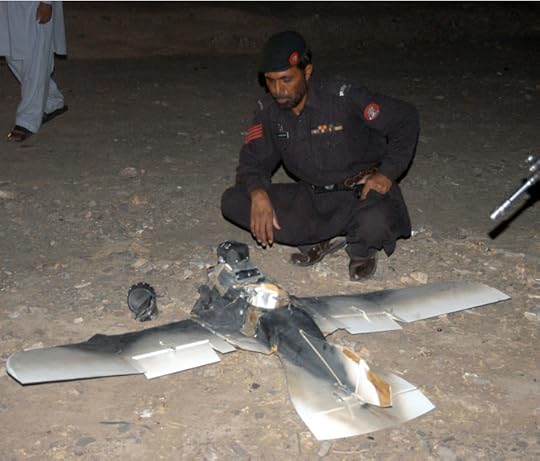
By Capt. Adam Thomas, USMC
Best
Defense future of war entry
There
have been a lot of conversation as of late regarding the rise of unmanned
systems (UxS) and how they are going to play a large role in future warfare. The
proliferation of these future systems is not only going to be used by states
but also non-state actors. This is an obvious fact but raises the question, how do we counter such unmanned systems that
can be acquired and weaponized by almost anyone?
With
all new technologies there is usually a double-edged sword when it comes to its
utility. A basic search on the Internet can allow anyone to find, purchase, and
outfit an unmanned system, whether it is an aircraft or ground system, and
employ it using their own creative devices. So, back to the original question:
How do we combat this proliferating technological capability? There are
multiple methods to examine. It depends on whether you want to kill, disable,
deny, or take control of the UxS. Future warfare development will have to focus
on how to counter these systems because there is no Department of Defense (DOD)
monopoly on this technology.
Future
adversaries will be capable of utilizing the Internet and mass media to gain
visibility and control the message they want the world to see. Due to
commercial technologies, they will be highly networked, which will allow them
to shape the battlefield quicker than U.S. forces, and they will be able to
exploit our own rules of engagement to gain decisive advantages and mass and
engage our military on their own terms. Using their own UxS, they will have
access to real time intelligence, surveillance, and reconnaissance that will
prove lethal if we don't find a way to counter this capability. Research and
development within private industry and the DOD has to be seriously focused on
a counter-UxS effort if we are to maintain our predominance on future
battlefields.
Capt. Adam Thomas,
USMC, is a helicopter pilot who works on counter-unmanned systems projects at
the Marine Corps Warfighting Lab. The
views in this post are those of the author alone and do not reflect the
views of the Department of Defense or the U.S. Marine Corps.
Disappointment in USNI's tendentious response to recent item on aircraft carriers

Last
week some of you may have noticed that I posted an item criticizing Proceedings, the journal of the U.S.
Naval Institute, for running an article by an
admiral about how great carriers are, without taking note of all the arguments made recently by
others about how carriers may be the battleships of the 21st century -- that
is, looking quite powerful but actually being quite vulnerable, and incredibly
expensive to build, equip, and operate.
On
the day the item ran, Tuesday, I gave Proceedings's
editor a heads-up about the item. Since then, I have received a series of
complaints and accusations from the journal's publisher and from a retired
admiral who is on the USNI board. I invited them to send along a response that
I promised to post promptly. Instead, they escalated and started complaining to
my editors. "Admiral Timothy
J. Keating, USN (Ret.) is a director of the U.S. Naval Institute, and asked
that we forward his letter to the editor based on his reaction to a recent Tom
Ricks post on Best Defense," wrote Bill Miller, the
publisher. "He submitted a comment to the original post that was not
published, quite astonishing considering that Ricks railed about one-sided
debates in that post."
Two
points here that long-time readers know are true:
I
welcome dissenting responses, and run lots of them. Indeed, last week I
repeatedly asked the USNI people to send me a response. They did not.
I
have no control over comments on this blog, and don't want to. As I have said
before, I am a First Amendment fundamentalist, and I also think that editing out
offensive material only helps the offending parties look better. Thus I don't
see comments before they are posted. I see them when you do.
Yet the USNI guys persist in believing and
asserting that I somehow suppressed Admiral Keating's comment. Indeed, Admiral
Keating this morning sent me an e-mail that seems to me to accuse me of quashing
it and then lying about it: "We had no opportunity to respond in a
timely fashion. I submitted my post within a day, as is reflected in the blog
comment queue. You say you didn't receive my post. I would say that bears a
closer look."
Normally I wouldn't
mention all this behind the scenes wrangling, but Keating's questioning of my
integrity pissed me off. I think he probably screwed up posting his comment and
is now are trying to pin that on me. But even if he is technologically
challenged, that shouldn't have been a problem, because last week I repeatedly
asked Miller and his editor, Paul Merzlak, to send me Keating's comment. If
Keating couldn't post it, I told them, I would. But they didn't send it.
Given this
experience, my opinion of Proceedings
continues to decline. And yes, they are welcome to respond to this. They have my
e-mail address if they need help.
A view from the high seas: The Navy is now more important than other services because it provides unfettered presence

By Lieutenant Doug
Robb, U.S. Navy
Best Defense guest
columnist
The
shifting strategic focus of the United States, alternately referred to as a
"pivot" or "rebalance," has crystalized a debate among our national leadership
about how the military can and should achieve its security goals in the coming
years. At the operational and tactical levels, it is irrefutable that we must
have an adequate number of highly-capable warships -- and a sophisticated
logistics system to support them -- operating forward and ready for tasking to
maintain the timely, efficient, and metered response to which we have become
accustomed.
Ships
and their capabilities are tools ("means" in military parlance) used to achieve
tactical, operational, and strategic objectives ("ends"). However, they differ
from other military hardware because a constant naval presence -- simply "being
there" -- has characteristics of both ends and means. As a result, the
"one-third, one-third, one-third" budget allocations traditionally apportioned
among the service branches simply will not achieve current or future security
goals. Policymakers should recognize not only the immense payoff that naval
forces provide, but how they can strengthen America's security prospects in the
years to come.
However,
the debate about the size and capability of the U.S. Navy must not narrowly
view ships as "means" to a tactical "end." Rather, it should acknowledge that
the routine non-wartime presence Navy ships maintain is an end itself -- one
that delivers tangible benefit to American security, influence, and
responsiveness unmatched by any other service or platform.
Unique to the Navy's
routine presence mission is the ability to provide these security requirements
in near real-time without the requirement of a host country. Naval forces are
inherently different from Army garrisoned forces because, while long-term land
occupations risk undermining security objectives, a strong naval presence can
reinforce them. Maritime forces require no diplomatic approval to operate in
international waters; they do not force domestic or foreign leaders to expend
political capital in order to place troops within striking distance of hot
spots; they do not put allies in awkward positions by asking them to house U.S.
forces when the local population may be averse to such presence.
Conversely, large
garrisoned forces require policymakers in both the United States and in the
forward-deployed country to make decisions that could weaken broader security
goals. For example, an augmented American ground presence in Germany or Poland
would surely increase regional tensions already stoked by the crisis in Crimea.
Moreover, it would be difficult for military strategists to argue that placing
such forces in Europe would help the outlook in the Pacific, where our security
focus will be for the foreseeable future.
The
ship on which I serve, the USS Kidd
(DDG 100), illustrates the value routine naval presence provides. Kidd recently concluded its 10-day search for missing Malaysia
Airlines Flight 370;
this journey took the ship from the Gulf of Thailand to the Java Sea, through
the Singapore Strait and Strait of Malacca, past the Andaman Sea and on to the
Bay of Bengal at the northern edge of the Indian Ocean. In total, Kidd transited more than 3,500 nautical
miles conducting visual and radar searches; its two MH-60R helicopters used
state-of-the-art sensors to comb nearly 15,000 square nautical miles during
round-the-clock sorties.
While
some may claim it was "luck" that Kidd
and Pinckney (DDG 91), which also
participated in the operation, were able to respond to this tragedy so quickly,
this timely reaction was made possible only by the U.S. Navy's continued and
persistent presence in the Indo-Asian region. Kidd was conducting routine operations in the South China Sea -- only
a one-day transit from the initial search location. "Luck," said Branch Rickey,
the general manager of the Brooklyn Dodgers who signed Jackie Robinson, "is the
residue of design."
The
U.S. Navy's presence in neighboring waters permitted a rapid response to the
search effort for the missing jetliner without the cost that would result from
deploying a San Diego or Pearl Harbor-based ship. Conversely, a deployment
announced specifically for the Flight 370 search might have sent a potentially
negative signal to the Malaysians that the U.S. distrusted their search
process.
Moreover,
the transit time (no less than three weeks) would have limited the value of the
U.S. contribution. This same logic applies to humanitarian assistance, disaster
relief, or any other situation in which tensions rise and threaten free access
to waterways essential to U.S. economic and security interests. Deploying to
these areas after an event occurs or tensions flare -- especially when American
naval presence has historically not been routine -- can limit the efficacy of
response and might well raise the very apprehensions the Navy's presence was
meant to quell.
The
Navy is omnipresent in every major geographic area around the world. The very
presence of naval ships simultaneously deters military aggression and assures
our allies, safeguards the sea lanes and the commerce that flows through them,
preserves territorial waterway boundaries and the right to resources contained
therein, and facilitates a response to natural disasters and other catastrophes
-- like the disappearance of MH370. In this case, showing up is well more than
half the battle.
The
U.S. Navy's resilience can only endure with the understanding that a firm
commitment to building and maintaining a first-rate Navy -- capable of being
present where our national interests lie -- is not only desirable, it is
necessary. This commitment is a policy prerequisite if the United States -- a
maritime nation whose interests have been safeguarded by the Navy since the
country's founding -- wants to retain the ability to influence outcomes, create
additional windows of diplomacy, and control escalation.
Lieutenant Robb holds
graduate degrees in security studies from Georgetown's School of Foreign
Service and the U.S. Naval War College. He currently serves as the operations officer of the USS Kidd (DDG 100) on deployment in the Asia-Pacific. The views
expressed are his alone.
April 2, 2014
How mission command works: Sherman's memoirs (III) show that it is based in trust, and must work as a two-way street
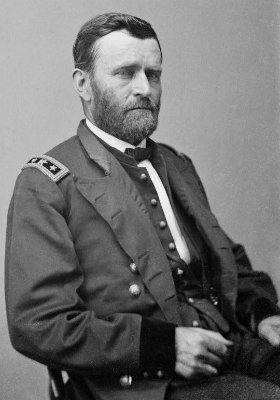
Mission command is a
two-way street, as is illustrated beautifully in the Civil War letters between
General Grant and his subordinate, General Sherman.
The letters,
reproduced in Sherman's memoirs, demonstrated how Grant communicated his
intent to Sherman, then offered his suggested course of action, and finally
asked Sherman for his thoughts. "In this letter," Grant wrote to Sherman upon
hearing that the march across Georgia had reached the sea, "I do not intend to
give you any thing like directions for future action, but will state a general
idea I have, and will get your views after you have established yourself on the
sea-coast."
Grant initially had
some notion that Sherman might move his infantry by sea to Virginia, but
Sherman really wanted to visit the
hard hand of war upon South Carolina. In Georgia he had focused on seizing or
destroying the property of plantation owners, but he next wanted to chastise
the South Carolinians as a whole for starting the Civil War. He wrote to Grant
that, "With Savannah in our possession ... we can punish South Carolina as she
deserves.... I do sincerely believe that the whole of the United States, North
and South, would rejoice to have this army turned loose on South Carolina." He
also thought it would help increase the pressure on Lee in Virginia.
Grant, persuaded by
Sherman's arguments, and his tone, agreed. "Your confidence in being able to
march up and join this army pleases me, and I believe it can be done. The
effect of such a campaign will be to disorganize the South, and prevent the
organization of new armies from their broken fragments.... Without waiting
further directions, then, you may make your preparations to start on your
northern expedition without delay. Break up the railroads in South and North
Carolina, and join the armies operating against Richmond as soon as you can."
Sherman's summary of
mission command comes later in the book, in his conclusions about the lessons
of the Civil War. It is pretty good: "When a detachment is made, the commander
thereof should be informed of the object to be accomplished, and left as free
as possible to execute it in his own way."
A puzzlement to me: Why two of my favorite writers sat out World War II
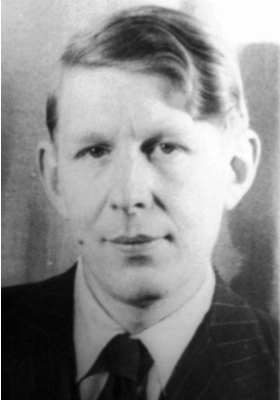
I love reading E.B.
White and W.H. Auden. Both are lovely writers and good observers. Yet I find I
fundamentally distrust both, because both essentially sat out World War II.
Neither was a conscientious objector, a position I respect. White at least grew
chickens on a farm. Auden simply left England, still a relatively young man at
age 32. I think it leaves a hole in the works of both.
So as I read, and
nod in agreement, or underline, I hear a little voice: "Yes, but...."
Maybe it is the end of 'counterinsurgency' -- but the beginning of 'armed politics'

My friend retired
Army Brig. Gen. Jim Warner comments that, "I personally
would prefer to stop talking about counterinsurgency and deal with what is in
effect armed politics. If we thought about it that way it might be more useful
in practice."
April 1, 2014
The Future of War (entry no. 24): The key tool we will need to prevail is … empathy
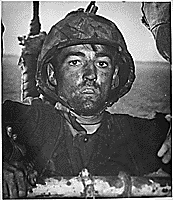
By
Major Daniel Leard
Best Defense
future of war essay entrant
I have always been a fan of science fiction. My father
raised me on the greats: Heinlein, Hubbard, and Asimov. Each story brought a
unique twist on future possibilities, but these literary pioneers, who were
among the first to view the future as radically different from their own time,
contained a common theme: Human history will always be human.
No matter how alien, mechanical, or fantastic the future
might be, human empathy would remain among the most influential forces in the
world. The history of warfare and its future are no different. Empathy has
always been vital in battle, and it is our empathic capacity that will
determine our success in future conflict. With some evidence suggesting that
empathy in America is in decline, renewing our understanding of empathy and its
role in warfare, acknowledging our shortcomings in empathic reasoning, and
increasing our empathic capacity are vital concerns for military leaders.
Empathy is the ability of human beings to understand each
other. This understanding begins with self-awareness and radiates out toward
others -- friends and foes alike. It is the ability to see through another's
eyes and understand the world as they see it. It was empathy (not Styx's waters)
that made Achilles immortal with sword and spear. To feel his opponents'
passion, fear, and perspective attuned him to strengths and vulnerabilities,
imminent blows and opportunities for attack. Empathy stood at the heart of Sun
Tzu's missive to generals: "know your opponent and know yourself, in a hundred
battles you will never be in peril." And empathy gave Otto von Bismarck the
foresight to make peace with a defeated Austria following the Battle of
Koniggratz when conventional wisdom advised a pursuit to annihilation. In war,
no other skill has been so vital to all -- soldier, strategist, and statesman.
However, as the range of our weapons increased, the
perceived utility of empathy on the battlefield diminished. No longer did the
soldier have to hold his fire until he saw "the whites of their eyes," and the
days would not be far off when soldiers could pull triggers that killed men on
other continents. In time, empathy for the enemy among U.S. strategists and
policymakers would also disappear. Gaetano
Ilardi observed that immediately following 9/11, empathy was
categorically absent and unwanted: "To empathize was to sympathize. To
sympathize was unimaginable, and unforgivable." This mentality generated much
of the political and military hubris that led to a number of the blunders in
Afghanistan and Iraq. To make matters worse, some studies indicate that empathy
among young Americans has steadily declined for the last three decades. If this
is true, even our most senior military leaders may be among the affected
population.
Though empathy may be lacking, a decade of conflict has
reminded us of its enduring value. Even now, we desperately want and need it.
We call for it with ideas such as cultural competence and emotional
intelligence. We create doctrine and concepts for human domains and dimensions
and engagement warfighting functions. Old lessons and habits, once forgotten,
can appear novel when rediscovered. Our efforts to quantify and codify this
skill of understanding and influencing people demonstrate just how far empathy
has slipped into clouded memory. In our search for empathy in the force, it is
essential that we appreciate its importance in our future. As discussed,
empathy is not sympathy. It does not produce a "kinder, gentler" force. Rather,
greater empathic capacity will improve our ability to employ lethality with
increased precision and discern the value of restraint in any given situation.
Energetic theorists, like science fiction writers, give us
varying ideas of what tomorrow may look like, and in some cases, they may be
correct. Future war may in fact be more urban, dominated by cyberspace, or
shaped by drones, robotics, or improvements in human performance. The cult of
big data promises that computers will understand and predict our adversaries'
actions far better than mere mortals can. These promises have their allure, but
at its core, warfare -- even the wildest visions of cyber-powered, push-button
warfare -- has always been and will always be subject to the complexities of
the human mind, and the human mind can only be reliably interpreted in kind.
Regardless of how sophisticated (or simple) a sword our future enemies may
wield -- a rifle, roadside bomb, tank, or keystroke -- the quality of our
defense will owe more to our understanding of ourselves and our attackers than
our technological prowess. This is a talent that only empathy can provide, and
most importantly in these financially lean times, it is a talent that costs
relatively little to engender.
Major
Daniel Leard is a U.S. Army infantry officer who is currently a student at the
Command and General Staff College. He holds a bachelor's degree in history from
West Point and is currently completing a master's program. The views presented
in this essay are the author's and do not represent those of the Department of
Defense.
Sherman (II) recalls a Civil War battle fought over some fields of blackberries

Sherman mentions in
an aside in his memoirs that there was once combat between skirmishers from the federal government
and the rebels over fruit. "I have known the skirmish-line, without orders, to
fight a respectable battle for the possession of some old fields that were full
of blackberries."
This was not just a
matter of good taste. Blackberries were useful in warding off scurvy, and so
particularly valuable when other antidotes, such as lime juice, pickles, and
sauerkraut, were unavailable.
British sniper kills 6 Taliban with one shot

At 850 meters, too.
No, they weren't lined up. The British sharpshooter, a lance corporal in the Coldstream Guards,
hit the trigger switch on the vest of a suicide bomber. When his bomb
detonated, it killed the five people standing around him.
March 31, 2014
1st thoughts on Gen. William Sherman's memoirs: Clarity in writing and warfare
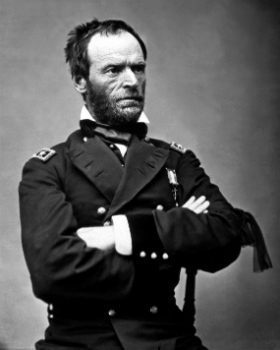
When I was in Austin
I picked up for $2.50 a used copy of both volumes of the memoirs of General William T. Sherman.
The first thing that
struck me was how clear his writing is, especially in issuing orders. In that
he was like Grant, but I think maybe even better in expressing his intent. Here,
for example, is part of his order for his march across Georgia, in which he set
off with about 60,000 and almost no supplies.
In districts and
neighborhoods where the army is unmolested, no destruction of property should
be permitted; but should guerrillas or bushwhackers molest our march, or should
the inhabitants burn bridges, obstruct roads, or otherwise manifest local
hostility, then army commanders should order and enforce a devastation more or
less relentless.
Like a good counterinsurgent,
he wanted to visit his wrath on the intransigent while sparing the friendlies
and the neutrals, telling soldiers they should be "discriminating ... between
the rich, who are usually hostile, and the poor and industrious, usually
neutral or friendly."
Thomas E. Ricks's Blog
- Thomas E. Ricks's profile
- 437 followers



